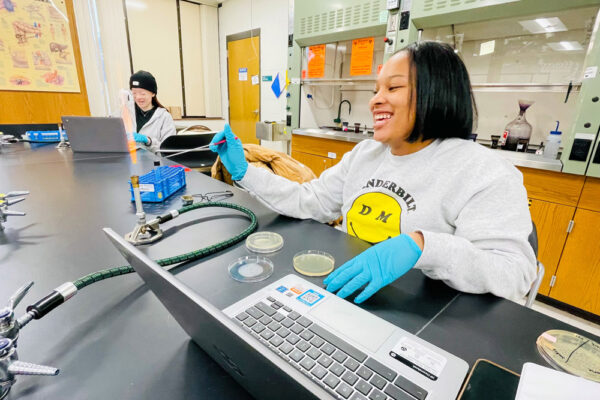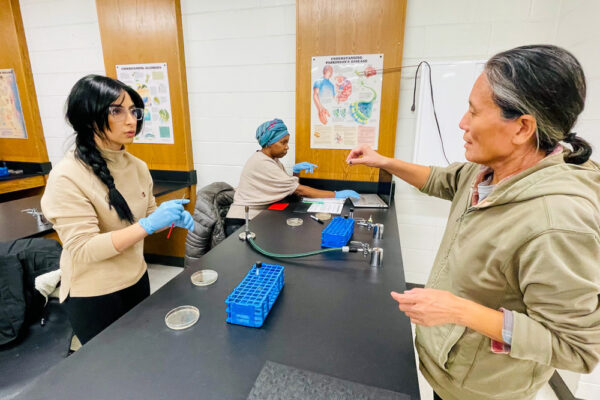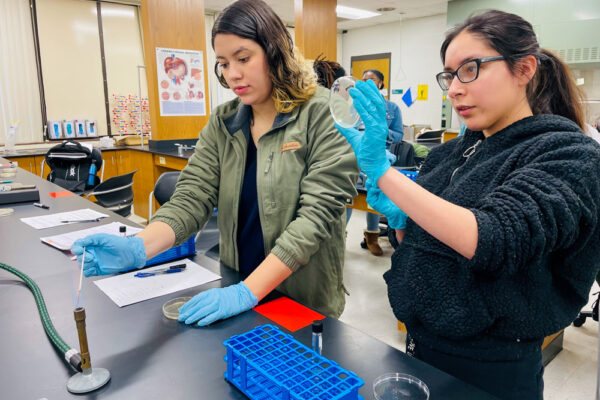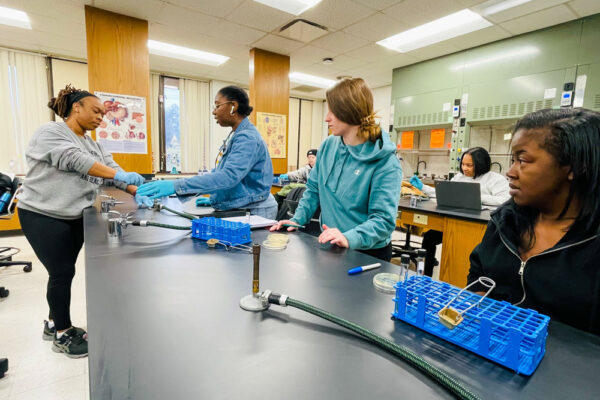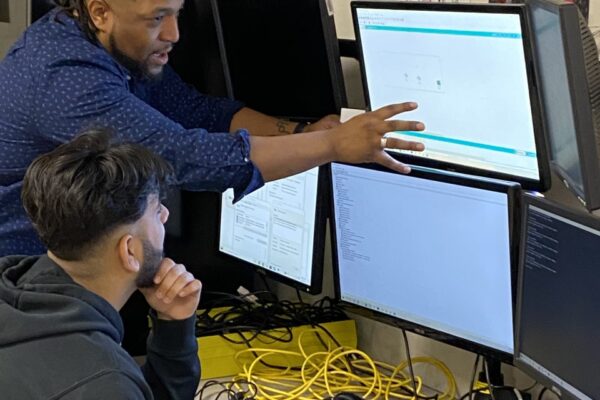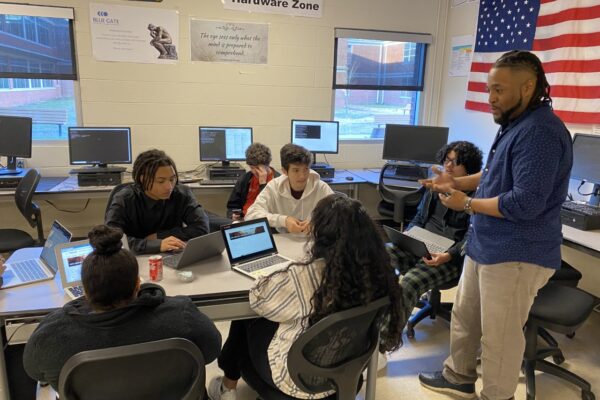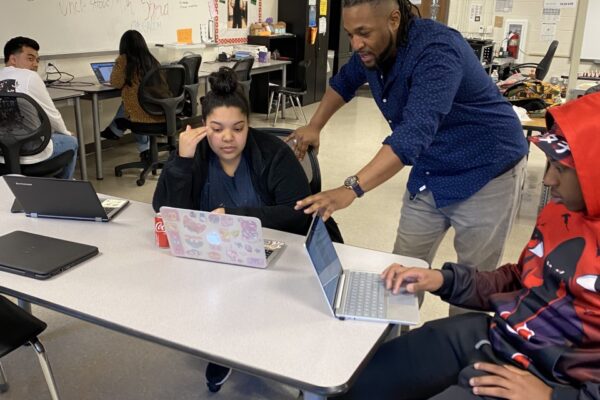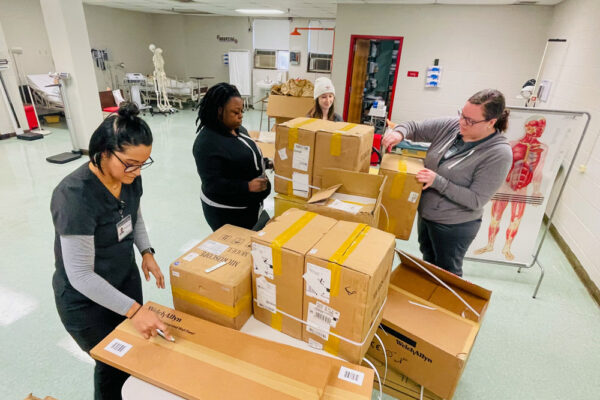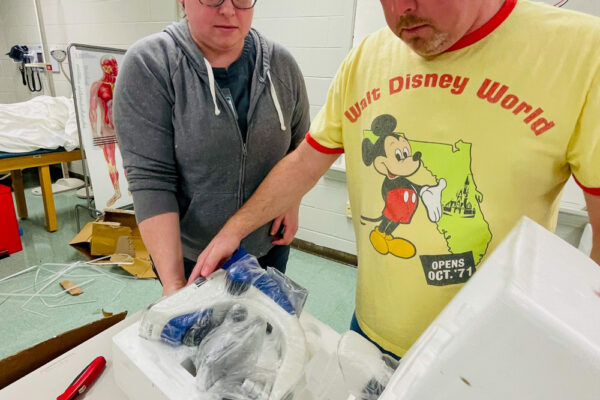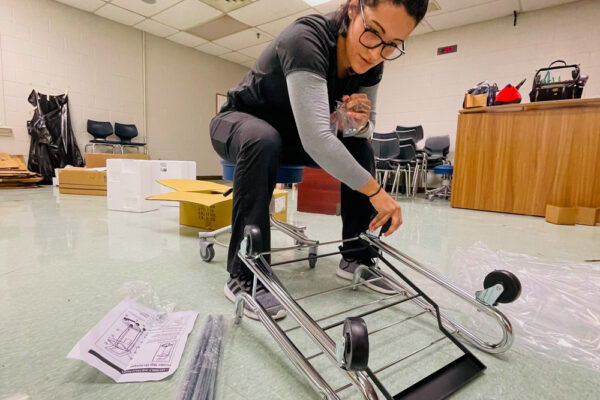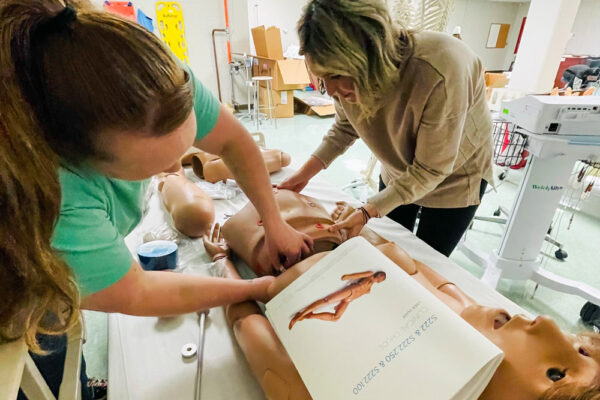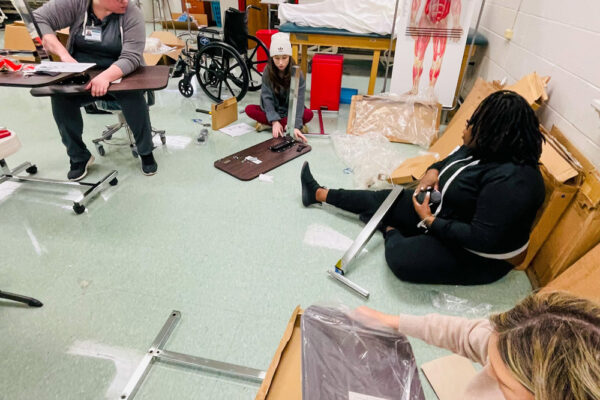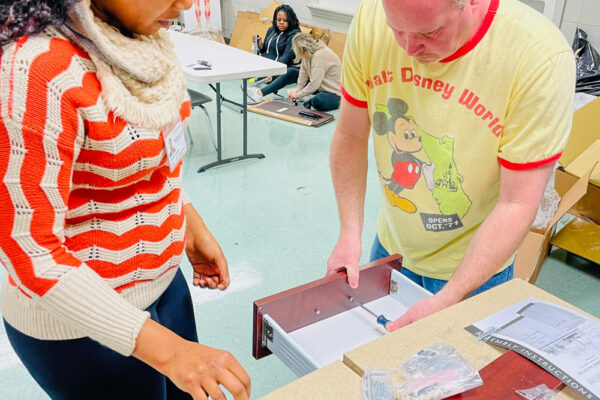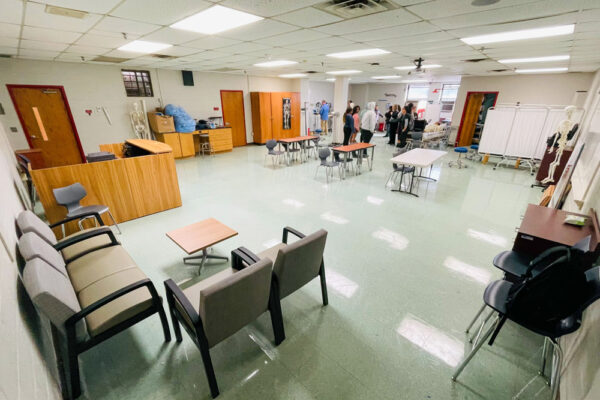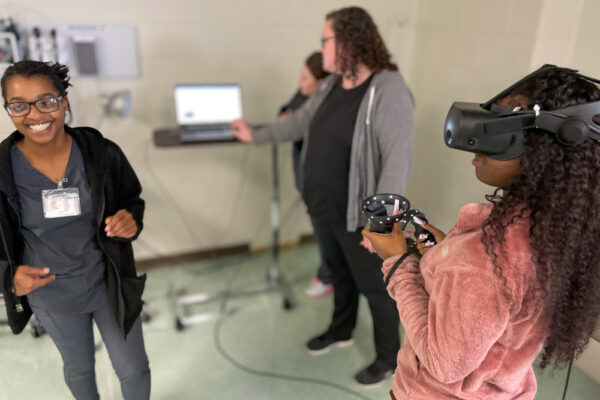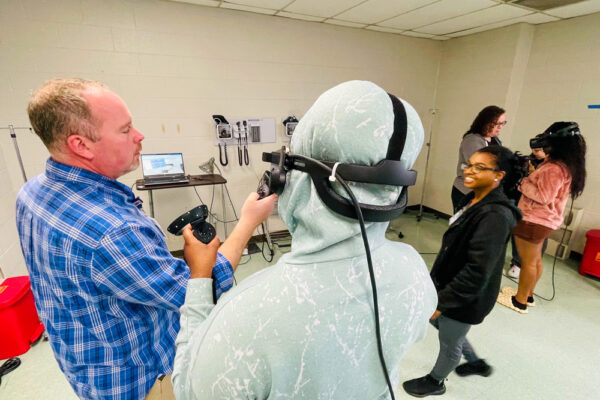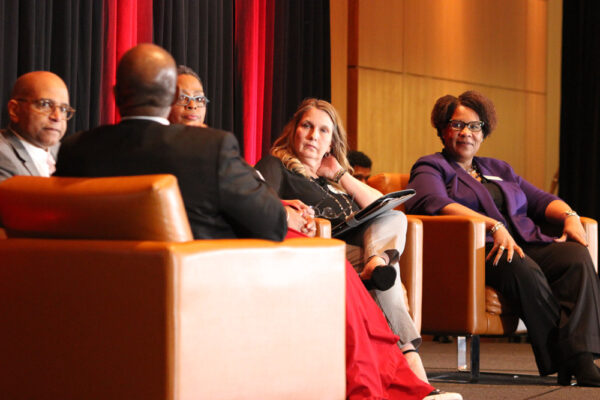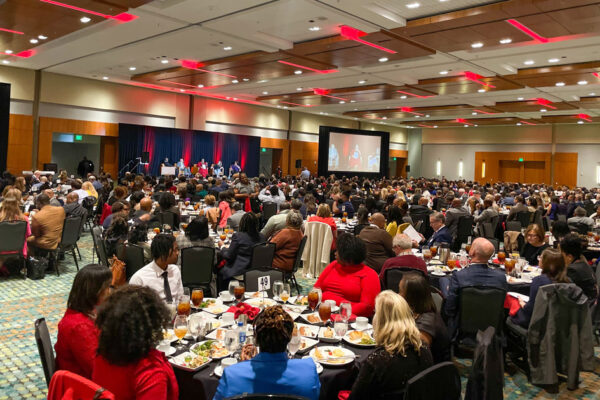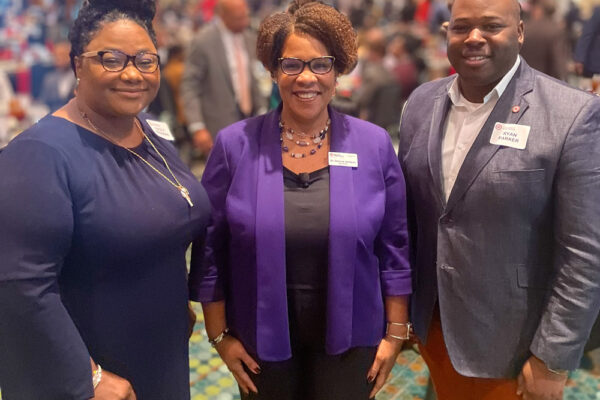
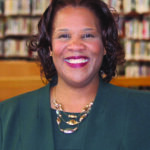
Update from the President
by Dr. Shanna L. Jackson
Greetings,
Nashville State is Moving Forward! We are beginning to see good results from key investments, strategic partnerships, and the collaboration taking place across campuses and divisions to increase enrollment and retention. Overall, we were up in both Spring headcount and FTE. It is exciting to see that we are making strong gains in improving the persistence of continuing students from fall to spring.
Many factors and people contributed to this improvement, but I want to highlight a major change that we believe made a difference. This fall we changed the advising model, and every new student was assigned a Student Success Advisor (SSA). Our SSAs have embraced the LEADS Core Values and are making a difference!
I also want to thank the Nashville State Foundation and every employee who contributed financially to provide critical resources for students. This spring, the Foundation supported over 200 students who otherwise would have been purged from classes. Without the Foundation stepping up, we likely would have experienced an enrollment decline. Your gifts to the Foundation make a difference!
Below are a few updates from the Office of the President.
Enrollment Update
To review the Spring 2023 Enrollment Dashboard click here.
Clarksville Campus Campus
The design for the expansion and renovation of the Clarksville Campus is underway. While construction costs could alter our plans, the project will include two new buildings and a complete renovation of the existing campus. I look forward to sharing the conceptual design of the new campus when finalized
SOAR Award Update
Please join me in congratulating our amazing Visual Communication students Eric Dawson, Loren Hatcher, and Isaac Marquez. Out of all the students across the state who submitted for SOAR Virtual Art Gallery award, our students were selected as the top three finalists! Their work will be displayed during the SOAR Awards and the TBR System Office for one year. Special thanks to Emily Naff and our amazing faculty who bring out the best in our students. As a reminder, our student Sarah Thaher is a finalist for the Outstanding Student SOAR Award. The SOAR winners will be announced March 29.
Support
I encourage you to make your physical and mental health a priority. As I often state, it is ok “not” to be ok. Please remember EAP services are also offered at no cost to all benefit-eligible employees and eligible family members. Visit Here4tn.com for more information.
Vision 2030: A Student-Ready College
A Student-Ready College is a bold but achievable plan. I am encouraged by the positive change happening inside and outside the classroom. We are indeed building a Culture of Excellence in People through our Teaching Center, ACUE cohorts, and evolving Professional Learning Opportunities. It is the internal talent of our college that will make the difference. It is time for the Nashville State Falcons to soar!

Dual enrollment sees massive growth
by Tom Hayden, Associate Vice President, Office of Communications and Marketing
In each of the past three years, Nashville State has seen an uptick in first-time college students and high school students taking dual enrollment classes. Be sure to check out the following story from Ashley Perham, Main Street Nashville, dated February 9, 2023
Dual enrollment students outnumbered first-time freshmen at Tennessee community colleges this school year for the first time, according to data from the Tennessee Board of Regents.
TBR Executive Vice-Chancellor for Policy and Strategy Dr. Russ Deaton said the reason for this statistic is mostly due to the significant drop in first-time freshmen enrollment, down 24% since pre-pandemic levels. Dual enrollment is up only 1% statewide, for around 16,700 students out of the total 70,000 community college students.
Dual enrollment courses give credit for both high school and college classes. Joint enrollment awards only college credit.
Like all Tennessee community colleges, Nashville State Community College has seen a drop in enrollment post-pandemic, 17% since 2019. However, the community college, which serves Cheatham, Davidson, Dickson, Houston, Humphreys, Stewart and Montgomery counties, has seen a 52% increase in dual enrollment students since 2020, and a 32% increase since last year.
This school year, 1,305 dual enrollment students outnumber the full-time first-time freshmen by 153 and almost outnumber the 1,415 total first-time freshmen.
For Davidson County specifically, the jump in dual enrollment is even higher, from 376 dual enrollment students in the fall of 2020 to 695 in the fall of 2022.
NSCC director of High School Initiatives Jeremy Callico said this jump was due to the Better Together partnership with Metro Nashville Public Schools.
Better Together started in early 2020 as a way to expand college access to MNPS students and boost college completion. The initiative has helped to expand dual enrollment opportunities and provide targeted student support.
There’s a similar program in place with Clarksville and Montgomery County schools.
Callico said some other factors could have led to the dual enrollment increase such as students trying to make up for time lost during COVID-19, realizing they can have good careers with just an associate’s degree or certificate, looking for a boost in the college admissions process and wanting a cheaper option to get their general education courses.
“Kids are coming out of some of our programs making $50,000, $60,000, $70,000 with an associate’s degree, and you have people who have master’s degrees who aren’t even making that much money,” he said.
Options for high schoolers
MNPS students have several options available to them to get college credit before graduating high school. Students can take Advanced Placement courses at their high school and get potential college credit if they get a qualifying score on the exam. Through NSCC, they can get credit for other courses through testing. This can happen through their own school with MNPS teachers who may not be qualified to teach a dual enrollment course but can access the course shell of an NSCC course. Students who pass a $25 exam can get credit at NSCC for the class.
But, Callico pointed out, with the “credit by examination” options, students don’t get college credit if they don’t pass the test. For dual enrollment options, students just have to pass the class. Students can sign up for dual enrollment classes online, at any NSCC campus or at their own high school with a qualified teacher. Dual enrollment courses give credit for both high school and college classes. Joint enrollment awards only college credit.
Starting this school year, the state has increased grant funds available for dual enrollment students and eased the requirements to remain eligible for the grant. Juniors and seniors who satisfy the dual enrollment criteria set by a college can get up to five courses paid for. Courses 6-10 are available at a reduced rate. (Legislation to allow sophomores to receive the grant has been filed this year.) To keep the grant, students must earn a cumulative total 2.0 GPA in their dual enrollment classes. Callico said the change in the grant requirement means that some students who may have lost their dual enrollment grant are able to get it back, thus contributing to the 320 new NSCC dual enrollment students this year. High school students can also take dual enrollment courses at a Tennessee College of Applied Technology. A grant is available for up to 1,296 hours of courses at a TCAT for any high schooler. (TBR data shows that TCAT dual enrollment numbers have climbed from 2,500 to 9,500 in the last seven years.)
NSCC requirements for dual enrollment have also changed. Students previously had to have a 3.6 GPA to take a dual enrollment class. That has dropped to a 2.8. Callico recommended starting with one class for those students with a GPA below 3.6. “It’s a huge difference between high school and college,” he said. “High school, everything is kind of set for you, it’s done. Here, it’s student-led, so if you’re not going to study, your instructor is not going to tell you, you need to study.”
MNPS and NSCC also offer two Early College programs, a way for high schoolers to graduate with an associate’s degree at the same time as they graduate high school. There are 95 early college students right now. Last May, 35 Early College students graduated with both their high school diploma and associate’s degree.
Callico said that putting dual enrollment options in front of high schoolers will help them “catch the vision.”
“We’re the best-kept secret, but we don’t want to be a secret anymore.”
Jeremy Callico
Glencliff High School
Mina Dorantes Robles, a junior at Glencliff High School, is one of a handful of students in the school’s first dual enrollment class, which covers the two college introductory-level Spanish courses. Her teacher, Delana Claybrooks, took dual enrollment English in her senior year at Antioch High School. “It was awesome to graduate from Antioch and to go to TSU and already have my freshman level of English knocked out,” she said. “So to be able to offer that here, I’m thankful that we were able to do it.”
Claybrooks and Robles both mentioned the benefits of the smaller class size. Typical classes at Glencliff, including Robles’s Advanced Placement classes, have about 25 students. Claybrooks’ dual enrollment class started the year with 11 students and still has seven this semester. “For seven to still be with us, it’s a feat really,” she said. Claybrooks praised the courage of students who “took the leap” into a dual enrollment class, especially Robles. “Dual enrollment English, maybe that’s not so scary, but dual enrollment Spanish… I think it’s a little scary.” She said that a dual enrollment course eliminates some stress that comes with Advanced Placement courses.
“With AP, you have to spend all year working and hope that at the end you can pass the test to earn the credit,” she said. “With dual enrollment, as long as you are following along, doing the work, that stress of having to be successful on one day is eliminated.”
Robles plans to apply for the Bell Tower Scholarship at Belmont University, where she hopes to get a full-ride scholarship. She said it was Claybrooks’ enthusiasm that motivated her to take the dual enrollment class. Claybrooks said that Robles is so self-motivated that it’s easy to be enthusiastic when teaching her. By the end of the school year, Robles, who already took Spanish I and is a native Spanish speaker, will have completed her high school language requirements and two college language requirements. She’s also hoping to earn credit from two Advanced Placement classes this year and has earned some credits from a middle school honors program.
Robles said that she thought the class would be a good way to challenge herself and improve her Spanish, but she also wanted to get a head start for college.
“When you graduate, to see on your transcript you’ve already got some carrying over. It’s the best feeling.”
Mina Dorantes Robles

NSCC Historical Minute: Rosetta Parks and Academic Skills
By Faye Jones, Ph.D. Dean, Learning Resource Center
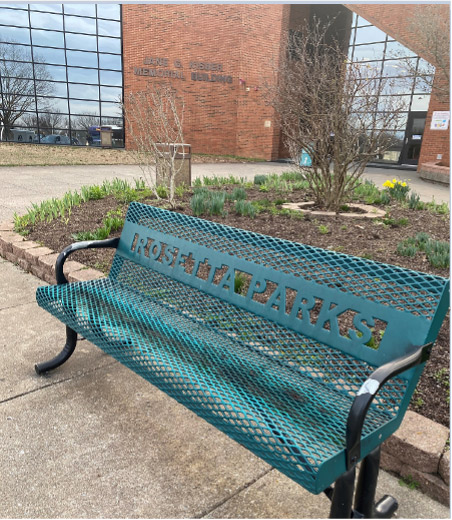
Rosetta Parks is first mentioned in the 1994-95 catalog as a counselor and instructor in the Academic Skills Department. She served in that position until her untimely death in 2000. When people described Rosetta, most used the word ‘patient’ at some point. Her ability to listen to students without judging or rushing them was something to behold, and I never watched her work with students without wanting to be like her.
In the mid-1980s, the Tennessee Board of Regents funded a program to support students who needed extra academic support at the beginning of their college careers. The Academic Development Department was founded with courses in math, reading, writing, and study skills. At that time, Nashville State was on the quarter system, and there were four levels of remediation. Students could test into any one of them. A few years later, as the college moved to semesters, the number of remedial courses was reduced to two: one remedial and one developmental.
When Rosetta arrived at Nashville State, another change to the department was taking place. The math and writing courses became part of the college-level departments in those areas. Reading, study skills, and counseling made up the renamed Academic Skills department.

Now, the old remedial/development courses are co-requisites to the college-level math and English classes. And the study skills course has morphed over the years into the current College Success class.
Achieving the Dream Conference
by Tom Hayden, Associate Vice President, Office of Communications and Marketing
The Nashville State team immersed itself in the annual Achieving the Dream conference. What was learned dovetailed with the College’s vision of leading the nation in achieving equitable outcomes for our diverse community of learners.
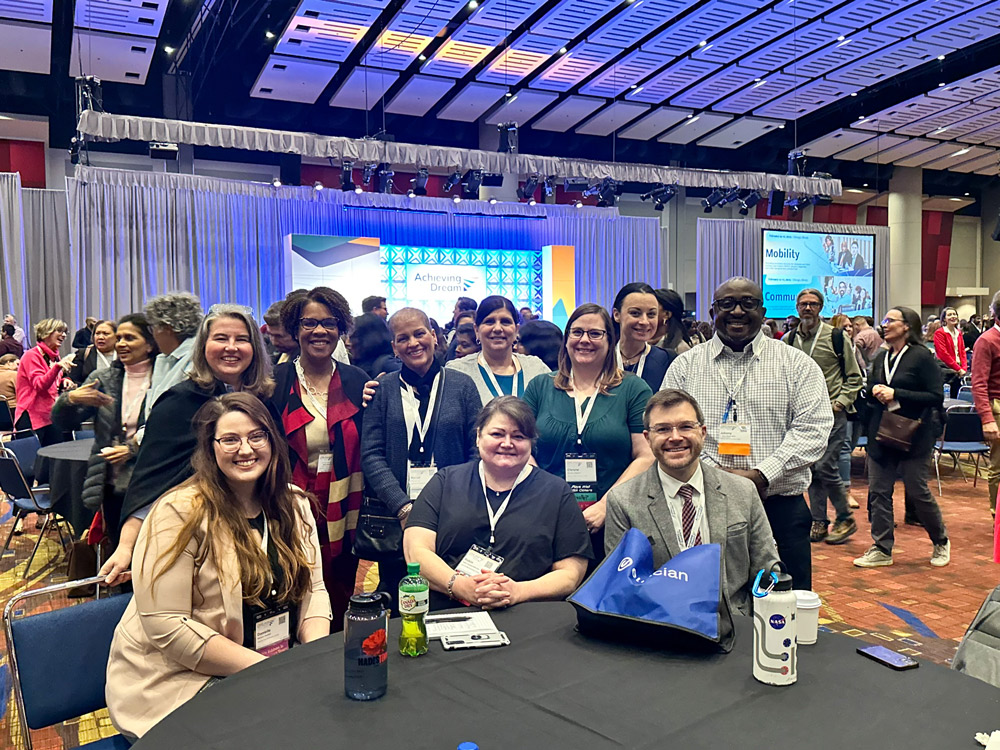
DREAM 2023 – Get on the Bus
By Janessa Jacobs, Instructor, Biology, STEM Division
At this Year’s Annual DREAM conference, the community of Achieving The Dream colleges gathered to learn about and share strategies used to drive access, momentum, mobility, and community impact.
The keynote speakers were informative and inspirational, and the DREAM scholars shared poems that literally brought tears to my eyes.
The community of colleagues who attended this conference will be sharing what we learned and how we can apply the information to moving our community forward, with Vision 2030 and LEADS values underlying all that we do as a college.
The themes of diversity, equity, inclusion, and bridging gaps in education, opportunity, and upward mobility for marginalized groups of people could be seen throughout the presentations all week long. There were several things that had a great impact on me, but for now, I would like to stick with two ideas… Community and Creativity.
As a Community College – in a community of Community Colleges – when thinking about our programs, the students we serve, the community we live in, and the restraints (such as cost and law) within which we must work, it is becoming increasingly important to get creative in our thinking about the ways we can address, and begin to solve, the problems underlying the equity gap experienced by our students. We can tap into the resources of the ATD community and look to the people in our community of schools for ideas about how to move forward with a variety of problems.
I learned about ways to be mindful of diversity, equity, and inclusion within the legal constraints of being unable to freely speak about some subjects with all students- particularly dual enrollment students. I learned about creative ways to think about guided pathways that decrease student stress and confusion throughout the enrollment and registration process for the duration of their chosen course pathway. I learned about ways to get students personally invested in the creation of their course and materials while creating classroom communities of learners who develop communication, teamwork, and problem-solving skills that are directly applicable to their careers when they leave our doors. And I learned so much more.
I look forward to all the ATD presentations that we will see this semester, and I hope to see you there!
The wealth of information that is available to guide us in envisioning and realizing all the big goals of our institution and our leader, President Jackson, is amazing.
And we can do it all, together, as a community.
However, a lot of the solutions will require creativity- thinking outside the boxes that have gotten all of education and society into the current state in which we find them.
Here are my first few thoughts on these first two Cs…
Community
- Look at the student population we serve, i.e. our community. These are the people who experience the greatest negative consequences due to the current socioeconomic structure of our state and country.
- In what ways can we, as a community in this community college, not only prepare our students for upward mobility but also allow them to use their skills to seek out worthy employment within this community?
- In an ever-rapidly globalizing economy, it is important to remain competitive in the world community while also honoring what makes our community unique. Fortunately for us, Nashville is unique for the diversity of people who call it home and we can look into the community, of our students and our stakeholders, to see an entire spectrum of differences possible in the world. We can use these brilliant differences to complement and assist each other, rather than causing division, and make the entire community a more unified, healthy, and happy place for everyone to be. We can model honoring the beauty and richness of every culture, while also seeing ourselves as one community of NSCC people working together to truly bridge the equity gap. We can light the way for our students, our community, and our country as we make Vision 2030 a reality.
Creativity
- We need to get creative in our thoughts about increasing enrollment. This can be done while serving the community in many ways, including outreach to students who have dropped out of high school, rescuing them, targeting them to dual enrollment programs, and increasing program offerings to include courses that result in certificates, credentialling, and continued education credits as needed by employers within the community.
- We can creatively think about advising and guided course pathways that take much of the confusion and stress out of the enrollment and registration process for both the students and the advisors.
- We can get creative in our strategies to increase student buy-in and engagement both in class and in the larger campus community. Using resources such as work-study funding we may be able to create student mentoring/tutoring/teaching assistant opportunities that benefit both students and faculty.
- We can look to the community, and our stakeholders, and get creative in the ways we may form partnerships to service everyone for mutual benefit. We can work to increase partnerships with local businesses to provide pipelines for our students to move directly from our schools into internships or jobs in our community. But, perhaps, we can also try processes that can work the other way too… like creating partnerships that provide opportunities for the students moving through advanced degrees at the schools around us to gain real-world experience by helping to fill some needs for our students. Therapists, social workers, lawyers, and all sorts of people in training may be able to gain the necessary clinical/practical experience while also helping to serve the needs of our students.
In what ways can you see and use the community around you (us), and the creativity within you (us), to start to improve the student experience and help to bridge the equity gap? Can you get on the bus?
Ultimately, what I saw in the schools that seem to be experiencing the greatest positive gains in student success and retention is a strong, vibrant community creatively using the resources around them to provide wrap-around support for all students. NSCC does a great job providing support in as many ways as we can, but there are still some gaps in things such as specific, skilled tutoring and mental health services like counseling and physical wellness that need to be filled.
I understand there is another C here… cost, but that may not have to be the dreadful thing it often seems to be and can be reevaluated through the lenses of community and creativity to arrive at some possible solutions. At the conference, I got a few ideas about this C too, but that is for a different discussion.

Human Resources News February 2023
by Janet Dennis, Personnel Assistant, Human Resources
New Hires:
| Name | Position | Department |
|---|---|---|
| Kelby Youngblood | Clinical Affiliate Associate | Healthcare Professionals |
| Melissa Arismendy | Student Services Specialist I | Welcome Center |
| Christopher Karr | Student Services Specialist I | Welcome Center |
Separation
| Name | Position | Department |
|---|---|---|
| Misti Meeks | Graduation Specialist | Admissions and Records |
| Maegan Puzas | Student Success Advisor | Student Success Center |
| Paula McCord | Secretary III | Workforce Development |
Associate Professor Shuli Zhang’s Microbiology Class
by Tom Hayden, Associate Vice President, Office of Communications and Marketing
I was walking past Professor Zhang’s class and noticed the great work they were doing. With approval from the professor and students I popped in and I observed their work. Thank you, Professor Zhang and students!

Tennessee Flavors!
By Chelsea Spence, Director of Development, NSCC Foundation

On behalf of the NSCC Foundation, I’m excited to announce that the Annual Tennessee Flavors tasting event has returned and will be held on Tuesday, May 16th at the White Bridge Road Campus. This year’s event will be held inside the S Building. From 6:00 -8:00 pm, some of Nashville’s top restaurants and drink artisans will join us on campus for a delicious evening in support of NSCC. All proceeds from this tasting event benefit the students of Nashville State.
As in the past, each Nashville State employee may purchase 2 tickets at a discounted rate of $25 off. Tickets will be available March 1st with special Early Bird pricing available while supplies last. The Early Bird Faculty and Staff price per ticket is $50 (regular staff price $75).
Staff Early Bird pricing of $50 begins March 1st and ends March 31st and can be purchased here: www.tnflavors.org/tickets/
If you are interested in volunteering at Tennessee Flavors, please contact Ryan Parker in the Foundation office: ryan.parker@nscc.edu
Get your appetites ready—We look forward to seeing you on May 16th!
New Skills Ready Grant at Nashville State Produces Results
Submitted by Tom Hayden, Associate Vice President, Office of Communications and Marketing
The New Skills Ready grant is in action at John Overton High School as Dual Enrollment students get hands-on experience and instruction in Mr. Stroud’s Computer Information Technology Intro to Networking class. See the following article by Nancy Eisenbrandt, Nashville Chamber.
In October 2020, JPMorgan Chase announced a five-year, $7 million investment in the Nashville community. The new Skills Ready grant will support the seamless transition of underrepresented students from high school into postsecondary programs to earn a credential or degree and enter a high-wage, high-demand career. The initiative will first focus on four MNPS high schools – Whites Creek, Pearl-Cohn, Maplewood, Overton – each with high concentrations of students of color, new Americans, and students who are economically disadvantaged.
The four priority areas for the grant include:
- The alignment and rigor of career pathways that lead to credentials with labor market value
- Building and scaling real-world work experiences
- Building seamless transitions to support postsecondary success.
- Closing equity gaps to ensure equitable participation and achievement in high-quality pathways that lead to high-demand, high-wage careers.
In five years, the goals of the grant include:
- Increases in student access to and success in high-value early college credit and credential opportunities.
- Strong partnerships between secondary and postsecondary institutions to facilitate successful student transitions.
- Increases in the number of students who complete postsecondary education and successfully transition into the labor market with high-value skills and credentials.
- Building new talent pipelines by increasing high-quality work-based learning opportunities connecting students with employers.
- Strengthening and/or the development of new high-growth, high-wage career pathways from secondary to postsecondary to employer.
The lead team for the grant includes Metro Nashville Public Schools, Nashville State Community College, Middle Tennessee State University, Tennessee Department of Education, Tennessee Higher Education Commission, Tennessee Department of Labor and Workforce Development, Tennessee Board of Regents, the Scarlett Family Foundation, Tennessee College Access, and Success Network, and the Office of Mayor Cooper. The Nashville Area Chamber of Commerce serves as the site lead for New Skills Ready -Nashville.
Over the first several months of the grant, the lead team has made steady progress in fulfilling its year-one action plan. Early wins include:
- A survey developed and released for MNPS students and parents and NSCC students, with a survey for secondary and postsecondary educators anticipated in the next few weeks.
- Three racial equity trainings for nearly 300 stakeholders and two more trainings planned in March and May for an additional 200 people.
- Initial conversations with state and local agencies to begin mapping the work-based learning ecosystem.
- Interviews with college access and success programs to understand their models for college advising to develop a new student guidance framework.
- Hiring a Ready Graduate analyst and a New Skills Ready project manager for MNPS
- Building base-line data to evaluate current pathways, alignment to the regional economy and disaggregated data on student success
For questions related to the New Skills Ready grant, contact Nancy Eisenbrandt (neisenbrandt@nashvillechamber.com)
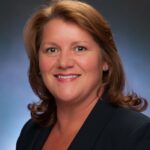
Getting to Know Our Students
By Dr. Julie Williams, Associate Vice President, Student Affairs
Ryanne is an adult student at Nashville State working toward an Associate of Science degree in Psychology. She graduated from a Williamson County high school almost a decade ago and never envisioned she could attain a higher education degree. As a member of a family with no college graduates, she entered the food service industry and never looked back.
After facing years of addiction, Ryanne found her sobriety and a passion for helping others who have faced similar issues in their lives. Knowing that she needed to start her academic journey at an affordable and small school where she wouldn’t feel lost in the shuffle, Ryanne enrolled at Nashville State. As a first-generation student, Ryanne felt alone and uncertain as she tried to navigate registering for classes, getting ready for her first semester, and imagining what being a college student would look and feel like.
Tennessee Reconnect is providing Ryanne with tuition assistance but leaves financial gaps for items like textbooks, school supplies, required technology, and transportation, among many others. After working with the Welcome Center and connecting with a Student Success Advisor, Ryanne applied for the Nashville Flex program. Thanks to this extra funding, Ryanne can work a little less and focus more on attending her classes and completing her coursework.
After building relationships with some compassionate faculty and her advisor, Ryanne has now completed three semesters successfully and has chosen to shift from being a part-time student to a full-time student this Spring semester. She has a 4.0 GPA and genuinely believes she will graduate from a four-year university and is excited about her future in a way she never was before. Ryanne epitomizes not only the unique struggles that our adult students face as they work toward their degrees, but also how a little extra support and empathy can make all the difference in their success.
Nashville State CSPT and Surgical Tech programs set up Academy of Health Sciences and Personal Care lab at Pearl Cohn High School
by Tom Hayden, Associate Vice President, Office of Communications and Marketing
Nashville State’s Central Sterile Processing program and Surgical Tech program faculty and students recently got together to set up a lab at Pearl Cohn High School’s Academy of Health Sciences and Personal Care with new equipment and learning spaces. Days later, Pearl Cohn students got to experience Nashville State’s Surgical Tech PeriopSim VR learning system.
Nashville State Has Key Role in Urban League of Middle Tennessee Annual Event Discussing Power in Equity
by Tom Hayden, Associate Vice President, Office of Communications and Marketing
Staff from the Nashville State Foundation attended and connected with hundreds of community leaders during the Urban League of Middle Tennessee’s annual Equal Opportunity Day luncheon at the Music City Center. Nashville State President Dr. Shanna L. Jackson was among a group of panelists who spoke about how communities can work together to address education, workforce development, small business growth, and healthcare.
Nashville State STEM was Well Represented at the Annual TLSAMP Conference
by Tom Hayden, Associate Vice President, Office of Communications and Marketing

Nashville State STEM is proud to have a strong presence at this year’s Tennessee Louis Stokes Alliance for Minority Participation Program (TLSAMP) annual Undergraduate Research Conference, held in Nashville, and hosted by TSU.
TLSAMP consists of a consortium of ten higher education institutions in Tennessee with the goal of supporting the recruitment and retention of minority STEM majors. The Undergraduate Research conference is an opportunity for students to learn all about research.
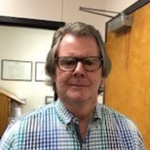
Facilities Management Department Report
Christopher Saunders, CFM, Executive Director of Facilities Management
The month of January started with the repair and clean-up of the Southeast and the White Bridge Road campuses’ Christmas Eve pipe breaks which were completed prior to the start of the spring semester. See the January issue of the NSCC Voice for the photos of the clean-up and repair.
We are proud to say that of the current major projects, we will have COMPLETED 7 of the 12 by the end of February.
Here is the rundown of the NSCC Projects and their current status:
Clarksville:
- LED Lighting and Cameras upgrade – 99.9% COMPLETE
- Campus Expansion – IN DESIGN PHASE
Dickson:
- Classes started – 1-16-23 – COMPLETE
North Davidson:
- Last Hood Certified – Electrical Closing out – AIA Punch – 99.9% COMPLETE
Southeast:
- Building Refurbishment Project – Signage being scheduled – UNDERWAY
- New Chiller – ADJUSTED SCOPE – UNDER REVIEW
Waverly:
- Retrofits from the Flood – Labs Case Goods – 99.9% COMPLETE
White Bridge Road:
- LED Lighting Retrofit – 99.9% COMPLETE
- H – Building Renovations – CONSTRUCTION DRAWINGS UNDERWAY
- Central Plant Upgrades – UNDERWAY
- Nursing Labs relocated – Open for classes 1-17-23 – COMPLETE
- Christmas Eve Floods – Clean up – COMPLETE
Thank you all for your ongoing support of the NSCC Facilities Management major projects.
The NSCC Voice
Founded 2017
Cliff Rockstead, Managing Editor
David Gerth, Assistant Managing Editor
Dale Rogers, WordPress Wrangler and Layout Editor
Isabella Putman, on assignment
February 2023 Contributors
Janet Dennis
Tom Hayden
Dr. Shanna L. Jackson
Dr. Faye Jones
Christopher Saunders
Chelsea Spence
Dr. Julie Williams
